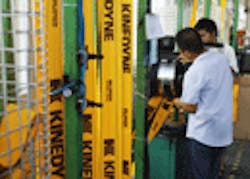A year after breaking ground, Kinedyne Corp. has officially opened its new 200,000-sq-ft complex in Nantong, China, in the Jiangsu Province.
The complex includes four buildings for 300 employees who will focus on manufacturing, quality control, engineering and supply chain management activities for the region.
“Although the global economy has not completely recovered from the recession, we’ve invested heavily in a huge, new production facility,” said James Klausmann II, Kinedyne’s executive vp. “Our philosophy has always been to take an aggressive approach to our company’s future. My father founded the company four decades ago, and we didn’t grow to reach a leadership position in our market segment by being timid. We’ve taken risks before, and we’re doing it again to ensure that a Kinedyne customer is buying the finest cargo control products available anywhere.”
Kinedyne said the facility will help it standardize its product range for global markets. Just recently, the company announced it was changing its color scheme on cargo straps to align with global initiatives, enabling Kinedyne to sell its products across worldwide markets.
The new production plant provides Kinedyne with the capacity to manufacture subcomponents necessary to build various products, the company said. By building the products in-house, Kinedyne believes it will speed its service time while improving quality. Many of the company’s products will now be built entirely onsite.
“Kinedyne has made a strong commitment to being the best-in-class supplier of cargo control products and our investment in this plant is a huge step toward that goal,” Klausmann said. “Our approach is to continue investing for the future; in new equipment and production capabilities, in new product development, and above all else, in developing our incredible team of employees. We believe strongly that if we challenge ourselves to do better, our entire team will deliver results that will benefit our customers around the world.”
The plant includes metal fabrication equipment including coil-fed stamping presses with capacity from 20 to 350 tons, wireforming machines, robotic welding and roll-forming equipment; metal processing and finishing equipment including heat treatment and plating lines, deburring operations, and an electrocoating paint line. There is also a tool-and-die shop.
